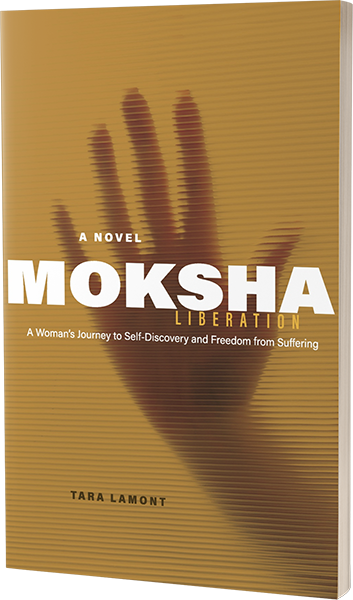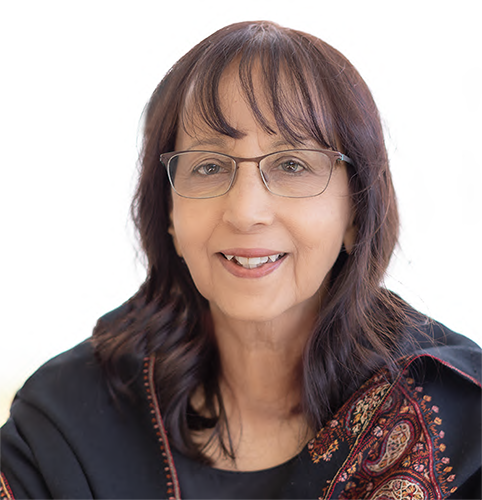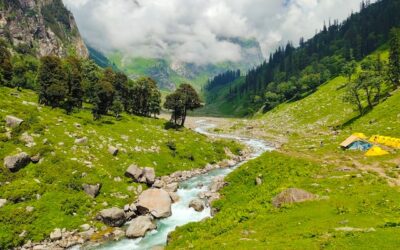Life Untangled
Discovering your True Nature—Existence, Consciousness, Bliss
A child loses a parent. A cancer diagnosis. A scratch on a new car. Hunger. Pain. Failure.
Suffering is universal, indiscriminate, without boundaries, a given.
Or is it?
Like Hermann Hesse’s Siddharta and Paul Coelho’s The Alchemist, Tara Lamont’s debut novel MOKSHA uses the power of story to convey the ultimate truth of the Upanishads, definitive texts composed by the ancient sages of India—on the path to enlightenment, immortality, and freedom from suffering. Non-dual Vedanta.
Read More
At a New Year’s Eve party in Manhattan, a privileged American woman listens closely to the story of the boy Nachiketa’s conversation with Yama, the Lord of Death. That night she heedlessly commits a crime and gets away with it. Ridden by guilt, she atones by subjecting herself to working in the worst hellholes imaginable—refugee camps. The pain and cruelty that surrounds her, sinks her into deep despair, fear, anger and self-pity.
At a conference five years later, she meets Sidh, the man who told her the story of Nachiketa, on that fateful New Year’s Eve. She insists that Sidh reveal the secret that the Lord of Death imparts to the boy. Sidh is reluctant at first, then, convinced that she is prepared, proceeds to teach her through dialogues and reasoning on the fundamental questions of life: who am I, what is my purpose, how can my suffering cease—The Gods—Shiva, Vishnu, Ganesha—play no small part in her quest but ultimately the effort is her own.
MOKSHA charts her spiritual journey set within the context of a troubled society and a threatened planet–taking her from South India to the Himalayas and back. Throughout, the tools of Vedanta point her towards the path to that infinite space beyond the heavens, beyond this world of suffering. Mystics and visionaries, from Thomas Merton to Rumi to Emerson, have had intimations of that Absolute Reality that resides within us and all around us. But it is only in the teachings of non-dual Vedanta that we find an eminently doable roadmap for the committed seeker to discover her true nature and attain moksha, liberation.




About the Author
Tara Lamont was born in Kannur, Malabar, on the west coast of India, a land of sunsets, white beaches and swaying palms. In ancient times, Kannur was the center of the world spice trade—Arab merchants arrived during the time of the Prophet, Marco Polo stopped by in 1298. Then came the Portuguese in 1498, followed by the Dutch and the English. Vestiges of these conflicting influences are apparent to this day.
Tara grew up against this backdrop of extraordinary plurality—her mother worshipped Devi, the nuns at school Baby Jesus, her father fashioned himself as a Buddhist existentialist, and her first best friend was a Sunni Muslim. She was immersed in stories—from the Ramayana, Mahabharata, the Odyssey, from O’Henry, Poe and Guy de Maupassant—was schooled in both Eastern and Western philosophies and several religions.
Read More
By age 14, Tara had attended six schools across India, each with its unique customs and culture, and by 18, she left for the University of California, Berkeley, where she received a degree in architecture. As a mainstream architect, Tara was responsible for award winning projects such as the San Francisco Opera House restoration. She has also been privately committed to developing innovative and sustainable housing typologies for the world’s urban destitute.
Tara has been a student of non-dual Vedanta for many years under the tutelage of Swami Tadatmananda at the Arsha Bodha Center where the Sanskrit source texts of Vedanta, the Upanishads, are analyzed and discussed in detail. Tara also studies Sanskrit at the Center to gain a more thorough understanding of the astonishing discoveries of these great Indian sages, in their supremely poetic language. MOKSHA is her attempt to present these profound and astonishing discoveries in a straight-forward manner so as to be accessible to the layperson as well as the knowledgeable seeker.
Tara lives and works near New York City and is completing SAMSARA, the second novel in a three-part Vedanta series.

About the Author
Tara Lamont was born in Kannur, Malabar, on the west coast of India, a land of sunsets, white beaches and swaying palms. In ancient times, Kannur was the center of the world spice trade—Arab merchants arrived during the time of the Prophet, Marco Polo stopped by in 1298. Then came the Portuguese in 1498, followed by the Dutch and the English. Vestiges of these conflicting influences are apparent to this day.
Tara grew up against this backdrop of extraordinary plurality—her mother worshipped Devi, the nuns at school Baby Jesus, her father fashioned himself as a Buddhist existentialist, and her first best friend was a Sunni Muslim. She was immersed in stories—from the Ramayana, Mahabharata, the Odyssey, from O’Henry, Poe and Guy de Maupassant—was schooled in both Eastern and Western philosophies and several religions.
Read More
By age 14, Tara had attended six schools across India, each with its unique customs and culture, and by 18, she left for the University of California, Berkeley, where she received a degree in architecture. As a mainstream architect, Tara was responsible for award winning projects such as the San Francisco Opera House restoration. She has also been privately committed to developing innovative and sustainable housing typologies for the world’s urban destitute.
Tara has been a student of non-dual Vedanta for many years under the tutelage of Swami Tadatmananda at the Arsha Bodha Center where the Sanskrit source texts of Vedanta, the Upanishads, are analyzed and discussed in detail. Tara also studies Sanskrit at the Center to gain a more thorough understanding of the astonishing discoveries of these great Indian sages, in their supremely poetic language. MOKSHA is her attempt to present these profound and astonishing discoveries in a straight-forward manner so as to be accessible to the layperson as well as the knowledgeable seeker.
Tara lives and works near New York City and is completing SAMSARA, the second novel in a three-part Vedanta series.
PREPARATION
You can’t make an omelet without breaking a few eggs and you can’t learn calculus without a basic understanding of mathematics. Vedanta is no different. The prerequisites are: discernment between the Real and the apparent; dispassion or the freedom from binding likes...
GODS and DEMONS
First, the Gods burst into MOKSHA, took over and started directing traffic. There was nothing I could do to stop Them. The Hindu gods of course—Lord Shiva & Parvati and Their sons Murugan & Ganesha. Lord Vishnu & Sri Mahalakshmi. Sri Krishna. Soon the...
PREFACE to MOKSHA
For some years, my sister Gita and I have been attending the brilliant lectures on the Upanishads given by Swami Tadatmananda at the Arsha Bodha Center, New Jersey. One morning, Gita raised the question as to whether there was some accessible way to impart these...



